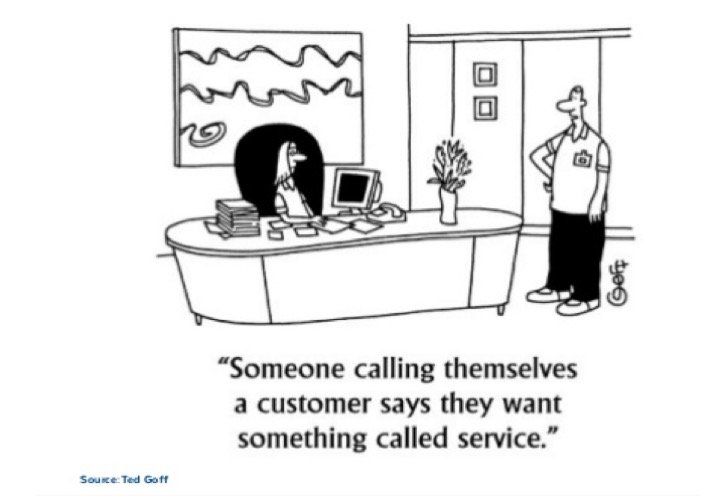The Question of "Where to Repair?" (and why questions like these keep re-occurring)
- by Paul Kelly
- •
- 10 Dec, 2018
Chronic Questions and why they resist and persist

I was recently asked the question of “where to repair”. This question relates to the repair services offered by mobile phone service providers. It's a topic I know very well, and a question that has come up many times in my career. Should we repair in store, do we provide a replacement phone, is a back-to-base repair the best strategy? The questions are always the same regardless of country, company or function.
However, this article is not about Reverse Logistics or Mobile Phone Repairs. The question made me think about a different perspective. Why do some questions, like this one, keep re-occurring?
In different industries and markets, there are similar perennial questions. To outsource a service or not? To offshore some part of production or not? To automate or not? To open stores, to close stores? How much inventory should we hold and where, How to make our service more joined up, etc.?
From now on, let's refer to these types of questions as chronic.
The answers to chronic questions are usually crucial to an organisation. They consume significant effort, brain power, and often emotion. They also persist, and re-occur more often than you would hope or expect!
Doctors use the term chronic to describe conditions that are persistent or long-lasting in their effects.
Chronic questions in organisations are the same!
Is it surprising that some questions need to be re-addressed? Is it inevitable that some problems will persist in organisations?
I have reflected on this and am proposing 5 reasons why this might be the case.
1. Things change!
Costs go up (or down), volumes change, new technologies emerge. Regulations change, competitors set new service level expectations, and customers' needs change. If significant factors change then, of course, it makes sense to re-address important questions.
2. It's more complicated than we can cope with
Taking into account all the many different factors is hard! Analysis of data, while useful, tends to focus on selected aspects of the system. Most operational teams lack the expertise to build a comprehensive picture. Understanding how everything interacts is equally challenging. For example, information may live outside of their function or organisation. As a result, any cost comparison might include one part of the process, but leave out other factors. We ignore impacts on the customer experience or factors such as risk. Or, we leave them to someone else to consider!
This video provides an excellent insight into the differences between complicated and complex situations and the implications it has for solving problems.
The Cynefin Framework by Dave Snowden
https://www.youtube.com/watch?v=5mqNcs8mp74
This provides a perfect segue into the next reason.
3. People make it complex
It's easy to think about an organisation as a system that we can analyse to reveal some underlying truth. Alternatively, we can engineer it to deliver predictable outcomes. All our experiences tell us that this isn't the case. Why, because of the different values and beliefs that people have. We some refer to politics. I prefer to think about it as perspectives. These perspectives impact the information we value the decisions made and our priorities. Different perspectives drive the ways we interact with and influence each other. How often do we experience people questioning some of the data presented? How often do they ignore critical bits of information we see as important? How often do we experience people drawing different conclusions from the same analysis?
Which brings me back to the question of "where to repair?" in answering this question I have often face different views. People will share value judgements such as;
"This is the right thing to do."
"I'm not sure this is one of our priorities."
"The customer experience is important."
(without understanding what that is).
Sometimes I've been told;
"we've tried this before."
(usually, this means we didn't try very hard, and it wasn't the same solution!).
In other words, such questions are usually both complicated and complex. Opinions matter, whether we like them or not! In some cases, these opinions are insightful and can help. In other cases, they add confusion and bring disorder. Organisations are not so easy to engineer, and outcomes are not so predictable.
4. Not having the right people "in the room"?
Related to all the above is the question of how to ensure that we include all the right people and groups. Including the right people will make it easier to appreciate different perspectives.
We will also find it easier to incorporate the different factors that make a situation complicated. The right people are those who can affect the outcome and those that the outcome would affect.
For some more thoughts on including and engaging with stakeholders, please see my articles published earlier:
https://www.linkedin.com/pulse/stakeholders-people-paul-kelly/
https://www.linkedin.com/pulse/participative-approach-change-paul-kelly/
5. It's the wrong question
Using the example of "where to repair"; is this the right question? We could reframe the question as: "how can we improve the repair experience?"; or "how can we improve the effectiveness and efficiency of the repair process?". Reframing questions like this can have a powerful effect. It can encourage more creativity. It can challenge preconceived ideas. It can also help to expand the scope and provide a more holistic view of whom we should and could involve.
Here are some excellent articles on the importance of asking the right question:
http://amorebeautifulquestion.com/excerpt-why-question/
And here is a short video I like; I love the idea of “inciting” questions:
https://www.gotolaunchstreet.com/small-business-strategies-ask-inciting-questions/
The 5 whys
So, 5 reasons why we face chronic questions. It's not only because "Things Change". All these reasons help to explain why we face the same questions time an time again. Why different factors appear to be important each time. Why we pay attention to different aspects of the question. Why we so often discard previous analysis (and models) as we deem them to be "no longer relevant”. Why straightforward, if complicated, questions are not addressed once with comprehensive analysis. Then, when things change again, re-addressed by updating and re-evaluating the original work. Why we attempt to answer them in different ways. Why we base the analysis on the perspective of the person who raised the question. Why we reach different conclusions from the same, or similar, information. Why such questions persist.
So what can we do?
The first step is to recognise when we have a chronic question.
Have we asked it before? Why are we asking it again? How was it answered last time (and the time before)? The most important question is: "What will we do differently to answer it more effectively?"
This will involve considering and addressing the 5 reasons listed (be honest). We can then design a process that:
· Helps you to think about what the right question is and who the right people are to answer it
· Acknowledges the complexity inherent in the systems we are trying to analyse
· Recognises the causes of the complexity, e.g. politics, processes, environment
· Supports those involved to systematically appreciate a diversity of perspectives, methods, and people
The good news is that this need not be difficult to achieve. If we take a more holistic approach, we will enhance the analysis and enrich decision making.
More importantly, it will encourage support to the decisions taken. As a result, we will reduce the risk of the question becoming chronic.
I would love to understand more about your industry's or organisation's chronic questions. Please let me know what they are. We could create a Top 10 list!
I would also appreciate your views on the causes of chronic questions. Do the 5 reasons make sense based on your experiences?
Have I missed anything?






